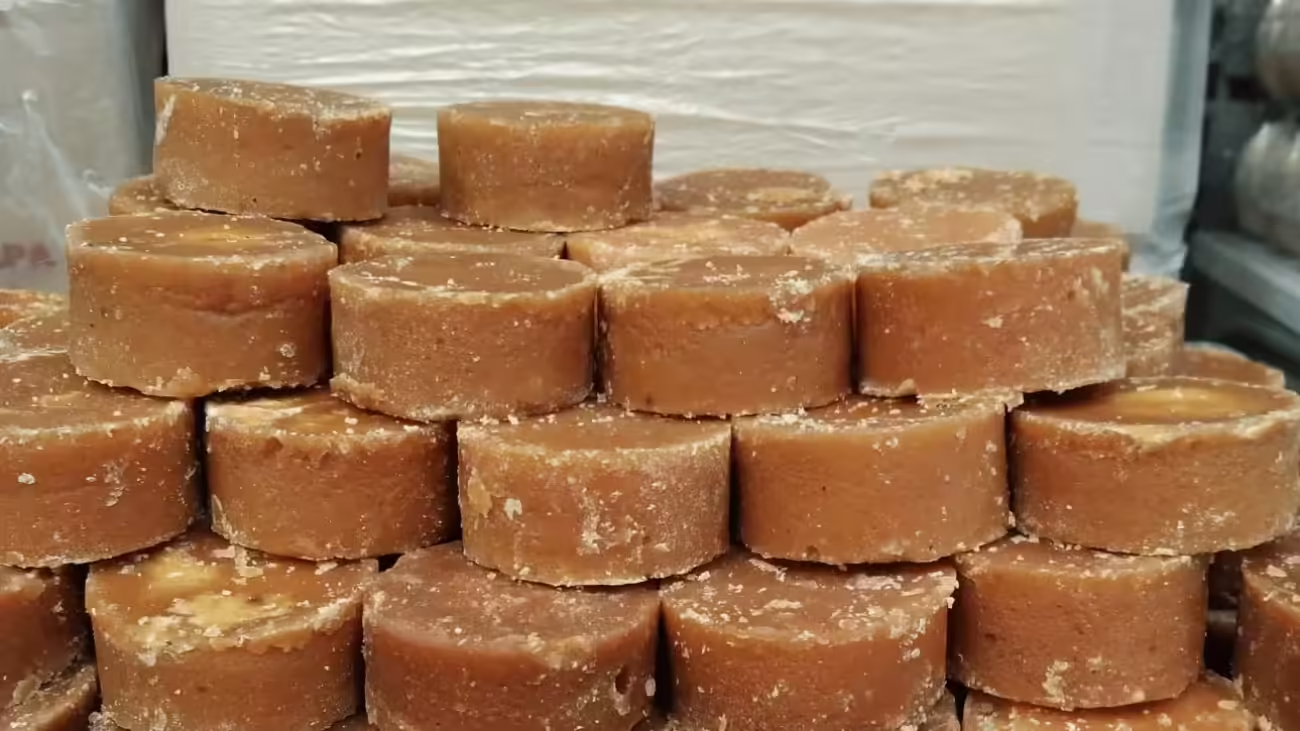Introduction
Organic jaggery export from India has emerged as a high-growth segment within the global natural sweetener market. As consumers shift toward unrefined, minimally processed sweeteners, organic jaggery (also called organic gur) is winning demand in Europe, North America, GCC and niche markets worldwide. Real Extreme Export, an international agro-export company, sources, processes and ships certified organic jaggery products that meet stringent buyer specifications and regulatory standards.
This article explains current export dynamics, product varieties, quality and certification requirements, packaging and logistics best practices, market opportunities, and actionable steps for buyers and suppliers. It is written to be search-friendly and useful for procurement managers, distributors, and importers seeking reliable organic jaggery suppliers from India.
What Is Organic Jaggery?
Organic jaggery is an unrefined sugar product produced from sugarcane juice (or occasionally date/palm sap) using traditional heating and concentration methods without synthetic additives, bleaches, or chemical clarifiers. The organic label denotes that the crop was grown under certified organic practices—no synthetic pesticides, fertilisers, or genetically modified inputs were used.
Why Global Demand Is Rising
Several consumer trends support growth in organic jaggery export from India:
- Increased interest in clean-label and ancient foods.
- Preference for unrefined sweeteners with micronutrients (iron, calcium, potassium) compared to refined sugar.
- Growing popularity of natural sweeteners in health foods, artisanal confectionery, beverages, and functional foods.
- Regulatory acceptance and organic market expansion in EU, UK, US, and Middle East.
For exporters like Real Extreme Export, these trends create opportunities for premium pricing and long-term contracts with health-focused brands and specialty retailers.
Key Varieties and Product Forms
| Product Form | Description | Typical Use |
| Solid Blocks (Gur) | Traditional solid lumps of jaggery with rustic appearance | Sweetening, cooking, traditional recipes |
| Powdered Jaggery | Finely milled jaggery powder for ease of use | Baking, beverages, confectionery |
| Granulated Jaggery | Free-flowing granules resembling sugar | Industrial food processing, instant mixes |
| Liquid Jaggery / Molasses | Concentrated liquid jaggery for industrial use | Beverage manufacturers, syrups |
| Organic Date/Palm Jaggery | Jaggery made from sap of date/palm trees | Specialty markets, ethnic foods |
Quality Standards & Certifications
Exporters must comply with both Indian regulatory frameworks and importing country standards. Important certifications and quality parameters include:
- Organic Certification: USDA Organic, EU Organic, India Organic (NPOP) — mandatory for premium organic claims.
- Food Safety: ISO 22000, HACCP, and FSSC 22000 help assure food safety management.
- Lab Testing: Moisture content (<1.5–4%), sucrose content, ash value, absence of contaminants (heavy metals, pesticide residues, mycotoxins).
- Traceability: Batch coding, origin documentation, and supplier declarations.
- Labeling Compliance: Ingredient lists, net weight, organic logo as per importing market rules, country of origin.
Real Extreme Export maintains third-party lab testing and full documentation to ensure shipments clear importer compliance checks and retail shelf requirements.
Packaging, Shelf Life & Logistics
- Packaging Options: Retail (250g–5kg retail pouches with moisture barrier), bulk (25–50kg jute or polywoven bags with inner liners), and retail tins/boxes for premium segments.
- Shelf Life: Properly processed and packed organic jaggery typically has 12–18 months shelf life at stable, cool, dry conditions. Humidity control is critical to prevent caking and fermentation.
- Shipping Considerations: Use humidity-resistant liners, desiccants for long transit, and choose freight mode (FCL/LCL/air) based on cost-to-speed tradeoffs. Declare HS codes and provide phytosanitary/health certificates as required.
Pricing & Market Channels
Pricing depends on variety, certification, grade (colour and purity), packaging and order size. Premium certified organic jaggery commands higher prices than conventional jaggery. Key market channels include:
- Direct supply to health food distributors and supermarket chains.
- B2B sales to confectionery and beverage manufacturers.
- Private-label partnerships for specialty brands.
- E-commerce sellers targeting natural foods shoppers.
Real Extreme Export supports clients with flexible MOQs, private labeling and co-packing options to enter these channels quickly.
Challenges & How Exporters Overcome Them
Challenges: seasonal sugarcane yields, quality inconsistency, moisture control during storage, and maintaining strict organic integrity throughout the supply chain.
Mitigation: contracts with certified organic farmers, centralized processing with hygiene protocols, controlled drying, and in-line quality checks. Real Extreme Export implements farm-to-factory traceability, periodic audits and independent lab verification to reduce rejections and protect brand reputation.
Market Opportunities (2025 Outlook)
- Rising demand in organic, natural and functional foods sectors in Europe and North America.
- Increasing adoption of jaggery as an alternative sweetener in craft beverages and artisanal confectionery.
- Growth in specialty ethnic markets and diaspora communities seeking traditional sweeteners.
- Potential in private label and white-label products for supermarket chains.
Exporters prioritising value addition (powdering, granulation, premium retail packs) and certification will capture higher margins.
How Real Extreme Export Adds Value
- Sourcing: Direct partnerships with organic farmers to guarantee supply and compliance.
- Processing: Modern milling and hygienic facilities that preserve nutrients and aroma.
- Customization: Private labeling, mesh sizes, blending, and tailored packaging for target markets.
- Compliance: End-to-end documentation, lab testing and certification management for seamless customs clearance.
FAQs — Most Asked Questions About Organic Jaggery Export from India
Export typically requires commercial invoice, packing list, certificate of origin, organic certification, sanitary/health certificate, and lab reports for contaminants.
When processed and stored correctly, shelf life ranges from 12 to 18 months. Proper moisture control and packaging extend durability.
Powder is finely milled for instant use; granulated jaggery is free-flowing for industrial processing. Both suit different applications and buyer preferences.
Yes—importers must hold or rely on valid organic certifications (USDA, EU, NPOP) to market the product as organic in their jurisdictions.
Yes, but formulations may need adjustment for moisture and flavour profile; jaggery imparts a caramel-like taste and darker colour.
Through certified raw material sourcing, standardized processing, third-party lab testing, and traceability protocols for every shipment.
Conclusion
Organic jaggery export from India presents a compelling opportunity for exporters and buyers alike. With rising global demand for natural and unrefined sweeteners, certified suppliers that deliver consistent quality, robust documentation and tailored packaging will lead the market. Real Extreme Export combines farm partnerships, certified processing, and export expertise to supply premium organic jaggery to international customers reliably. If you need a customised product specification sheet, pricing quote or export plan, Real Extreme Export can prepare it immediately to match your market needs.


